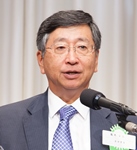Going Through TPP Negotiations
April 20, 2016
Mr. Koji Tsuruoka
Ambassador Extraordinary and Plenipotentiary,
Embassy of Japan in the United Kingdom
�� I served as Chief Negotiator for the TPP (Trans-Pacific Partnership) free trade deal, under Prime Minister Abe and Economy Minister Amari. As Japan came late to the negotiation, all the members engaged in this extremely difficult task resolved to endure the heavy responsibility to get concrete results. Sadly enough, I lost my direct subordinate to the challenging negotiation.
I served as Chief Negotiator for the TPP (Trans-Pacific Partnership) free trade deal, under Prime Minister Abe and Economy Minister Amari. As Japan came late to the negotiation, all the members engaged in this extremely difficult task resolved to endure the heavy responsibility to get concrete results. Sadly enough, I lost my direct subordinate to the challenging negotiation.
��TPP negotiation was based on a ��unified�� chain-of-command structure to ensure holistic perspective and approach, making it exceptional for trade negotiations. This was because the agreement covered 30 different chapters with conflicting interests of different ministries and agencies. Besides, Japan had to catch up and even get ahead of the negotiations that had continued for more than three years. We committed ourselves to unite our national strength and to overcome the negative effect of sectionalism. With a clear-cut political leadership and decision-making process of Prime Minister Abe and Minister Amari, responsible officers from different ministries and agencies were all put under the direction of the TPP Headquarters at the Cabinet Secretariat Office.
��I can say the participation of Japan into the TPP negotiations facilitated agreement in two respects. Firstly, among the 12 countries (Singapore, New Zealand, Chile, Brunei, U.S.A., Australia, Peru, Vietnam, Malaysia, Mexico, Canada and Japan) engaged in the negotiations, only the U.S.A. had been an overwhelming economic superpower until Japan joined and brought a considerable change to the economic scale of TPP. It became much easier to formulate a free-trade agreement with Japan through TPP, making the agreement more attractive. Secondly, Japan played an instrumental role in coordinating countries with conflicting national interests as a mediator to win support from all. A superstate is not cut out for such a role to listen to what smaller countries have to say. Japan engaged in close dialogue with each country and worked in collaboration, if necessary.
��Japan joined the TPP negotiations held in Kota Kinabalu, Malaysia, in 2013 for the first time. We made a request to the Malaysian government to host a reception and invited the delegates from all 12 countries to get to know each other better through friendly talks. We gave away a small bottle of Japanese sake as a souvenir, manufactured at a brewery in Tohoku that had survived the Great East Japan Earthquake.
��Countries managed to reach an agreement in principle at the TPP Ministerial Meeting held in Atlanta in 2015. I recall not a few negotiating partners came up to me and said ��I can celebrate this agreement with the Japanese sake given to all the delegates at the reception.�� I realized anew that goodwill and sincerity would lead to good results. Japan does not lie or bluff. Thus we have gained trust in the international arena. We also tried to give detailed explanations on the position of Japan. For example, other countries agreed on almost complete tariff elimination on agricultural products, while Japan had nearly 20% of them exempted. When we were asked the reason, Minister Amari strove to give explanations to every single minister attending the negotiations. Thanks to the dedication and enthusiasm of exceptionally capable government officials who made full use of the knowledge and expertise accumulated at each ministry and agency, we succeeded in working collectively to facilitate the negotiations towards an agreement.
��As a Chief Negotiator, I was entrusted with full authority to make the best decision to enhance the negotiations. If necessary, we could make alternative suggestions on the spot, without going through time-consuming consultations among ministries in Tokyo. Such all-out effort by the TPP negotiators paved the way toward a favorable agreement for Japan.
��TPP will integrate 12 economies into a dynamic economic zone which generates roughly 40% of global GDP and is home to 800 million people. While Japan faces declining birthrate and aging of its population, many TPP member countries have a promising market supported by population growth with high percentage of young people. It is noteworthy that the middle-class keeps growing in this huge market, which can lead to the growth of consuming class. Japan should tap into consumers�� needs and provide good-quality, reasonably-priced Japanese products. A Special Committee of the House of Representatives has been established to continue deliberations on TPP. I sincerely hope prompt measures will be taken to make steady commitments towards the promotion of free trade and economic integration.
��Japan began its TPP negotiations by gathering all our strength. I am grateful that countries around the world kindly accepted our approach and we received a fair evaluation. Our sincerity was appreciated and understood. Unfortunately, the Japanese press has not reported much on our endeavors but we will further strive to make achievements through diplomacy and negotiations and to strengthen our international presence.